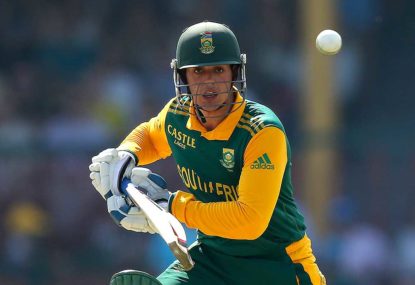Travis Head obliterates RCB in record breaking century... and just wait for the celebration!
RCB have suffered a massive HEAD-ACHE after Travis Head smashed the fastest century by an SRH player in just 39 balls, as they amassed…

The 2016 IPL auction concluded on Saturday, and while there were the usual spills, thrills and talking points at the end of the one-day event, one of the bigger limelight-catchers was the way Delhi Daredevils went about their business.
They splurged a lot but surprised most by doling out that cash to unheralded players.
It was a change from previous years’ auctions, when a chunk of their money was spent on big-ticket players, who ended up disappointing as they either looked past their prime or fell off the cliff as far as their form was concerned.
More cricket:
» Nevill the shock inclusion as Australia announce World T20 squad
» The Liebke Ratings: New Zealand vs Australia third ODI
» Has Brendon McCullum retired a tad too early?
» McCullum: Withdrawing appeal would have been ‘disrespectful’
» Watch: New Zealand retain Chappell-Hadlee Trophy amid controversy
» New Zealand vs Australia highlights: New Zealand take Chappell-Hadlee trophy
» Scorecard: New Zealand vs Australia third ODI
Delhi spent the most among teams, and were the only franchise to complete the maximum stipulated quota of 27 players. By the looks of things, if they were allowed to, the Daredevils might have bought a few more too.
Social media was abuzz, expressing surprise at some of the tactics used during the auction, as the Daredevils baffled with not only their choices but also the money they coughed up to get those cricketers.
The fans were only just recovering from South African all-rounder Chris Morris’ price-tag of $AUD1.45 million when the Daredevils went all guns blazing after uncapped Indian all-rounder Pawan Negi, spending $AUD1.75 million.
To be fair, Negi was hyped before the auction, having made it to the Indian World T20 squad following a string of good domestic performances, but is spending that kind of money on the likes of Morris and Negi good business?
There were other issues too.
Delhi brought in three wicketkeepers during the auction, when they already had South African gloveman Quinton de Kock in the line-up. One understands the need to have an Indian keeper in the squad, because of the rules around the maximum overseas players allowed in the final XI, but bringing in three back-ups?
Also, they failed to land any big-name players left in the auction pool – they had a chance to go for the likes of Yuvraj Singh, Kevin Pietersen, Shane Watson, George Bailey, Aaron Finch, Ishant Sharma, Irfan Pathan and Dale Steyn, but either didn’t bid for them or refused to carry through with the bids.
In short, following a string of underwhelming showings in the IPL – they finished last in two of the last three seasons – the general consensus was that Delhi might have missed the boat yet again at the auction.
But Delhi’s performance at the auction should be judged at the end of the season.
Their shift in strategy has come after the tried and tested didn’t work for them. They spent big bucks on ‘big ticket’ players in previous seasons, but that clearly didn’t pay dividends.
Investment in youth seems their new direction, which goes against the norm – older, experienced players are proven match-winners, and long gone are the days when T20 was regarded as a youngster’s game alone.
And yet Rajasthan Royals’ win in the first IPL boiled down to the performances of youngsters under being guided by a shrewd stalwart of the game.
There have been talks of getting Rahul Dravid in as Delhi coach. If that were to go through, the Daredevils would have the kind of figure they need to guide their inexperienced but exciting group.
Dravid is getting his coaching apprenticeship with the Indian Under-19 team, whom he has led for the past few months.
If the Dravid deal doesn’t happen, Delhi would do well to get someone similar – Gary Kirsten would have been an ideal candidate, but he was removed from his post last season.
Furthermore, a lot of criticism that came Delhi’s way after the auction was to do with the amounts they spent on those inexperienced players.
Hypothetically speaking, had Delhi brought in the same set of players for a lesser cost – say Morris, Negi and Carlos Brathwaite were brought in for costs ranging between $AUD250,000 and $AUD750,000 – the assessment may have been different.
Much like spending a lot doesn’t always lead to success, not all teams can adopt the principles of Moneyball as easily as MLB team Oakland Athletics did in 2002 and 2003.
What’s important is for teams to have a definite short and long-term tactic, and for those in the upper echelons to facilitate the tactics.